Overview
The Bachelor of Science in Nursing (BSN) is a three-year full-time program, that is delivered in three terms per year. The program is based on a concept, competency-based approach. Students are exposed to the latest technology, innovative practice-based experiences, and provided with a range of resources.
The BCIT BSN program is committed to preparing excellent nurses who are practice ready to meet the complex care needs in today’s health care environment.
About the program
- Accelerated, three-year, full-time Bachelor of Science in Nursing program
- Three intakes per year: January, April and September
- BSN Simulation provides students with hands-on, safe and state-of-the-art experiences to prepare learners for practice
- Clinical experiences in a variety of acute care settings and community agencies
- Two specialty nursing courses are included in the degree
Visit Program Details to learn more about our BSN program.
Who it’s for
This program is for individuals who:
- Are able to care for the physical and emotional well-being of a variety of patients
- Have the emotional stability to effectively manage the needs of patients, and to cope in stressful situations
- Are fluent in written and oral English
- Are team players, able to work independently, and take initiative while maintaining ethical standards and values
- Have a strong work ethic and are committed to a heavy course load
- Are able to work day, night, and weekend shifts in a physically demanding, fast-paced environment
- Are Canadian residents
- Thrive in an innovative, technical, and caring environment
- Are interested in developing problem-solving and critical thinking skills
- Have good manual dexterity to work with sensitive material and equipment
This BSN program is guided by the British Columbia College of Nurses and Midwives (BCCNM) standards. In order to work as an RN, graduates must meet the required competencies and standards set by the College. You can find out more on these sites:
Visit Entrance Requirements to learn more about program entry requirements and registration.
What grads can do
Registered nurses work in hospitals and community healthcare settings around the world. Visit Graduating and Jobs to discover opportunities.
- Next up Entrance Requirements
Entrance Requirements
British Columbia College of Nurses and Midwives (BCCNM) Registration Requirements
Once you graduate from the Bachelor of Science in Nursing program, you must apply for registration as a Registered Nurse with the BCCNM to be eligible for employment. To register you must meet the BCCNM Competencies and Standards for Entry-Level Registered Nurse Practice in British Columbia.
It is important that you are aware of these prior to applying for admission to the Nursing program.
These requirements are described on the BCCNM’s Website at the following links:
If you have concerns about whether or not you have the required skills and abilities for admission to or progression through the Nursing program, contact BCIT’s Accessibility Services.
Application processing
This program is open to applications:
- January intake: June 1* to July 15*
- April intake: October 1* to November 15*
- September intake: February 1* to March 15*
*or next business day
We recommend that you apply early. All supporting documents must be submitted by the application deadline.
Indigenous applicants: Read about Indigenous student support available for the Nursing program.
Entrance requirements
BCIT does not guarantee admission to applicants who meet the minimum requirements. Obtaining a seat in the Nursing program is competitive. The Nursing program mandate is to select those applicants deemed to have the best opportunity for success. The Nursing program does not maintain a waitlist into future intakes.
Competitive Entry: Two-step process
Step 1: Meet the following entrance requirements
- English language proficiency: Category 2 – English Studies 12 (67%) or equivalent
- Math: one of the following:
- Pre-Calculus 11 (73%) or 12 (67%) or
- Foundations of Math 11 (73%) or 12 (73%) or
- Other acceptable BC and Yukon courses or
- MATH 0007 (73%)
- Chemistry 11 (73%)
- Academic Foundations: 18.0 post-secondary credits with a minimum of 67% in each of the following courses:
- ENGL 1177 - Academic Writing or equivalent* (3.0 credits)
- BHSC 1200 - Human Anatomy and Physiology or equivalent*, completed within the past three years (6.0 credits)
- PSYC 1101 - Introductory Psychology 1 or equivalent* (3.0 credits)
- General Education [PDF] electives at a 100 level minimum in at least two different academic disciplines (6.0 credits)
* View acceptable equivalent courses [PDF]
All Academic Foundations courses must be completed prior to application. Midterm grades are not accepted. Only official transcripts are to be submitted with your online application. An official BCIT transcript is not required.
- Complete the following form for submission with your online application:
- Mandatory Applicant Questionnaire [PDF]: This form will be used with other entrance requirements in the competitive selection for the program.
Applicants who have completed post-secondary studies outside of Canada, the United States, the United Kingdom, Australia or New Zealand will require a comprehensive evaluation of their credentials by the International Credential Evaluation Service (ICES). Credential evaluation reports from other Canadian services may be considered. These reports must include course-by-course evaluations and GPA calculations.
Read more about how to meet BCIT’s entrance requirements
Step 2: Conditionally selected applicants
If you have been conditionally accepted to BCIT you will be notified, and the following information will be required in order to be accepted into the program:
Immunization Review [PDF]
Submit to Student Health Services. For instructions and more information, visit Student Health Services’ Health Science Student Information. An immunization review at BCIT and a TB skin test are mandatory requirements for this program.
Once these and any other outstanding conditions have been met, you will receive notification of your full acceptance.
Clinical requirements
Note: All health care workers who come into contact with patients at publicly funded health care facilities or in the community, including at long-term-care facilities, must have the influenza vaccine or wear a mask during flu season. This policy affects all students who will be entering a clinical setting. As such, you will be required to provide proof of your immunization or agree to wear a mask at all times through the flu season prior to being placed in your clinical studies.
Face Respirator Fit Testing
A face piece respiratory fit test may be required before students are permitted to enter the clinical practicum. Upon successful completion of the fit test, the original certificate must be presented to the program and annual re-fitting is required. Students are expected to carry their certificate with them at all times during their practicum.
For the Respirator Fit Testing, fit testing with a N95 respirator (1860, 1860s or 1870) is required and must be performed, in accordance with CSA Standard CAN/CSA-Z94.4-02. Fit Testing must also include, inspection, cleaning, maintenance and storage of protective equipment. Students will be given specific instructions in preparation for their fit testing by the provider they choose.
CPR - BLS (HCP)
Current Cardiopulmonary Resuscitation (CPR) - Basic Life Support for Health Care Providers (HCP). Certificate must be submitted prior to the first day of term 1 and be recertified annually..
Certifications from any of the following agencies are accepted: Lifesaving Society, Red Cross, Heart & Stroke Foundation, St Johns Ambulance, and the Canadian Ski Patrol.
International applicants
This program is not available to international students. View available programs.
Apply to program
To submit your application:
- Include proof of meeting all entrance requirements.
- Convert all transcripts and supporting documents to PDF files.
- Have a credit card ready to pay the application fee.
Apply Now
Scheduled Intakes
January, April and September each year.
myCommunication
Within two business days of submitting your completed application, BCIT will send a message to your personal and myBCIT email addresses. All correspondence regarding your application will be posted to your online myCommunication account at my.bcit.ca. We will send you an email when a new message is posted. It is important to watch for these emails or regularly check your account online.
You can expect to receive communication concerning the status of your application within four weeks.
- Go back Overview
- Next up Advanced Placement
Advanced Placement
Conditions
You may be eligible to apply to an advanced level of the program through re-admission. Please note that applications are considered based on:- Competitive entry: if the number of applicants exceeds available seats, BCIT will accept those deemed to have the best opportunity for success.
- Seat availability: confirmation may not be available until approximately one week before the term begins.
- Approved success plan: acceptance will, in part, be dependent upon the successful implementation of a plan resolving previous academic difficulties.
Note: Applicants who have not previously completed a portion of this program at BCIT must apply to Term 1. Direct entry to an advanced level (e.g. for LPNs or RPNs) is not an option.
Re-admission
You can apply for re-admission if you:
- were previously admitted to this program and completed part of it at BCIT and
- want to re-enter the program at an advanced level.
Please refer to the BSN Re-admission Policy [PDF] to determine your re-admission eligibility and review student responsibilities.
Applications to each upcoming term are due by noon on the Friday of Week 12 in the prior term.
Submit the Technology Re-admission form [PDF] with your application.
Ready to submit your application? Apply now.
- Go back Entrance Requirements
- Next up Costs & Supplies
Costs & Supplies
Nursing Student Tuition Grant
The Nursing Student Tuition Grant released by the Ministry of Post-Secondary Education and Future Skills will be available to all students enrolled in Bachelor of Science in Nursing (BSN), Bachelor of Psychiatric Nursing (BPN) and practical nursing (PN) programs from September 1, 2023, through to August 1, 2026. The value of the grant is $2,000 per program year per eligible participant. The maximum value of this grant per student is $6,000 for bachelor’s programs.
Indigenous students in BSN programs will receive an additional tuition credit of $5,000 per year. This funding is already available to Indigenous students enrolled in BPN and PN Programs.
The Nursing Student Tuition Grant is available to Canadian Citizens and Permanent Residents only, there is no application process. Tuition grants will be automatically applied by the post-secondary institution.
More information on the Nursing Student Tuition grants can be found here [PDF].
Tuition fees
Use our tuition estimator to find tuition and fees for this program.
For more information on full-time tuition fees, visit Full-Time Studies Tuition & Fees.
Books & supplies
Costs of the Nursing program include education materials, CPR certification, criminal record check, annual face respirator fit testing, uniforms, shoes, stethoscope, blood pressure cuff, copying, stationary, penlight, and transportation expenses.
Information on obtaining a criminal record check and the fees involved will be mailed to students upon acceptance.
These are general estimated costs and subject to change. Students may incur additional expenses.
*Education materials will include electronic and text materials.
Financial assistance
Financial assistance may be available for this program. For more information, please contact Student Financial Aid and Awards.
- Go back Advanced Placement
- Next up Courses
Courses
Program matrix
| Term 1 | Credits | ||
|---|---|---|---|
| BSNC 1030 | Practice of Nursing 1 | 4.0 | |
| BSNC 0010 | Nursing as a Profession 1 | ||
| BSNC 1000 | Nursing Knowledge 1 | 4.0 | |
| BSNC 1020 | Context of Nursing and Health Care 1 | 3.0 | |
| BSNC 1055 | Communication in Nursing Practice 1 | 3.0 | |
| Term 2 | Credits | ||
| BSNC 2030 | Practice of Nursing 2 | 6.0 | |
| BSNC 2000 | Nursing Knowledge 2 | 4.0 | |
| BSNC 2055 | Communication in Nursing Practice 2 | 2.0 | |
| Students are responsible for scheduling the following required 3.0 credit Liberal Studies course during Term 2. This course is offered through Flexible Learning (Part-time Studies). Flexible Learning courses must be paid for in full at the time of registration. | |||
| LIBS 7001 | Critical Reading and Writing* | 3.0 | |
| *A minimum grade of 65% is required in LIBS 7001. | |||
| Term 3 | Credits | ||
| BSNC 3030 | Practice of Nursing 3 | 6.0 | |
| BSNC 3000 | Nursing Knowledge 3 | 4.0 | |
| BSNC 3020 | Context of Nursing and Healthcare 3 | 4.0 | |
| Term 4 | Credits | ||
| BSNC 4030 | Practice of Nursing 4 - Health Promotion and Illness Prevention in Individuals and Populations | 6.0 | |
| BSNC 0040 | Nursing as a Profession | ||
| BSNC 4000 | Nursing Knowledge 4 – Health Promotion and Illness Prevention in Individuals and Populations | 3.0 | |
| BSNC 4020 | Context of Nursing and Health Care 4 | 3.0 | |
| Students are responsible for scheduling the following required 3.0 credit Liberal Studies course during Term 4. This course is offered through Flexible Learning. Flexible Learning courses must be paid for in full at the time of registration. | |||
| LIBS 7021 | Health Ethics* | 3.0 | |
| *A minimum grade of 65% is required in LIBS 7021. | |||
| Term 5 | Credits | ||
| BSNC 5030 | Practice of Nursing 5 | 6.0 | |
| BSNC 5000 | Nursing Knowledge 5 | 4.0 | |
| BSNC 5055 | Communication in Nursing Practice 5a | 1.0 | |
| BSNC 5060 | Communication in Nursing Practice 5b - Research in Nursing Practice | 3.0 | |
| Term 6 | Credits | ||
| BSNC 6030 | Practice of Nursing 6 | 6.0 | |
| BSNC 6000 | Nursing Knowledge 6 | 4.0 | |
| BSNC 6020 | Context of Nursing and Healthcare 6 | 4.0 | |
| BSNC 6055 | Communication in Nursing Practice 6 | 2.0 | |
| Term 7 | Credits | ||
| BSNC 7030 | Practice of Nursing 7 | 6.0 | |
| BSNC 7000 | Nursing Knowledge 7 | 3.0 | |
| BSNC 7020 | Context of Nursing and Healthcare 7 | 1.0 | |
| BSNC 7055 | Communication in Nursing Practice 7 | 2.0 | |
| Plus a 3.0 credit Specialty Nursing Theory elective course.* | |||
| Term 8 | Credits | ||
| BSNC 8030 | Practice of Nursing 8 | 7.0 | |
| BSNC 8020 | Nursing and Health Care | 3.0 | |
| BSNC 8055 | Communication in Nursing Practice 8 | 3.0 | |
| Plus a 3.0 credit Specialty Nursing Theory elective course.* | |||
| Term 9 | Credits | ||
| BSNC 8100 | Practice of Nursing 9 Preceptorship | 18.0 | |
| *Specialty Nursing Electives | Credits | ||
Students must take 6.0 from one specialty (e.g. If Emergency is chosen as the focus of practice the courses completed must be NSCC 7150 & NSER 7110). Students who select Neonatal or Perinatal as their focus of practice also complete a Neonatal Resuscitation course. To take a specialty nursing elective at another post-secondary institution student contact the Nursing Placement Coordinator. BSN students select from the following Specialty Nursing courses: |
|||
| NSCC 7120 | Critical Care Nursing Theory 1 | 4.0 | |
| NSCC 7150 | Dysrhythmia Interpretation and Management | 2.0 | |
| NSER 7110 | Emergency Nursing Theory 1 | 4.0 | |
| NSHA 7100 | High Acuity Specialty Nursing Theory 1 | 4.0 | |
| NSHA 7120 | Advanced Medical/Surgical | 3.0 | |
| NSNE 7100 | Neonatal Theory 1 | 3.0 | |
| NSNE 7200 | Neonatal Theory 2 | 3.0 | |
| NSNN 7200 | Nephrology Nursing Theory 1: Introduction | 3.0 | |
| NSNN 7400 | Nephrology Nursing Theory 2: Introduction to Dialysis Nursing | 3.0 | |
| NSPE 7100 | Pediatric Theory 1 | 3.0 | |
| NSPE 7200 | Pediatric Theory 2 | 3.0 | |
| NSPN 7100 | Perinatal Nursing Theory 1 - Healthy Childbearing Experiences & The Newborn | 3.0 | |
| NSPN 7150 | The Breastfeeding Experience | 3.0 | |
| NSPO 7100 | Perioperative Theory 1: Developing Perioperative Partnerships | 3.0 | |
| NSPO 7250 | Perioperative Theory 2: The Nurse in the Scrub Role | 3.0 | |
| Total Credits: | 137.0 | ||
Transfer credit
Do you have credits from another BC/Yukon post-secondary school? Do you want to know if they transfer to courses here at BCIT? Check out BCIT's Transfer Equivalency Database to find out.
- Go back Costs & Supplies
- Next up Program Details
Program Details
Student guidelines, policies and procedures:
The program:
The program prepares highly skilled, practice-ready graduates eligible for nurse registration. Upon completion of the program, graduates are eligible to write the National Council Licensure Examination (NCLEX).
The Bachelor of Science in Nursing program is committed to educating and equipping learners to graduate and launch successful careers in nursing. To support this aim, the BSN program emphasizes the development of professionalism, communication, professional growth, reasoning and reflection, creative leadership, facilitation skills, and technical skills.
Courses are offered in a variety of formats including lecture, laboratory, small group work, online, and clinical experiences. Learning opportunities in hospitals include clinical practice with acutely ill seniors, adults, children, and families. Learning opportunities in community health include clinical practice in public health, home care and other community health agencies. The clinical practice experience can be during the day, evening or night shift, including weekends and holidays.
The program uses self-directed learning, small group learning, and a scrambled classroom teaching learning strategy, to help students develop the skills required in the health-care system.
Self-directed learning is a method that encourages students to take charge of their learning by identifying learning needs, implementing strategies to meet these learning needs, and evaluating progress toward learning. These skills prepare students for lifelong learning and professional growth.
Small group learning is an approach in which students work in groups of four to twelve people to learn material and discuss course issues. This approach also develops communication and facilitation skills.
A scrambled classroom is a combination of short bursts of lecture interspersed with active learning strategies. The effectiveness of this teaching learning strategy is dependent on students completing readings and pre-class work. Active learning contextualizes knowledge and provides an opportunity for learners to build on and apply knowledge through active engagement with content, peers and the instructor, providing learners with the skills and competencies required for safe patient care within a complex health care system. One key nursing competency this teaching methodology promotes is collaboration and teamwork. Additionally, completing prep work is critical to the success of a practice profession.
Aboriginal applicants: Read about Indigenous student support available for the Nursing program.
International applicants: This program does not accept applications from international students. View programs that do
Program length
Three years, full-time.Grading
The minimum passing grade for all theory courses in this program is 65 per cent.
Program delivery
In person: This program is delivered on campus.
Program location
Burnaby Campus
3700 Willingdon Avenue
Burnaby, BC
- Go back Courses
- Next up Graduating & Jobs
Graduating & Jobs
Our grads are ready
Recruiters know BCIT Nursing graduates succeed. Our students graduate with the expertise and capabilities to work in a multitude of healthcare settings across BC.
Apply for your RN designation
Grads are required to write the National Council Licensure Examinations for Registered Nurses (NCLEX-RN) to earn their Registered Nurse (RN) designation for licensure. The designation has yearly renewal fees and quality assurance guidelines. Visit the British Columbia College of Nurses and Midwives (BCCNM) for more information on registration and renewal, competencies, and standards. We recommend that you’re aware of these standards prior to applying to the program.
Career opportunities
Registered nurses work in a variety of hospitals and community health settings. Careers usually start with casual positions in acute care agencies on a medical and surgical ward. Some graduates are hired to work in public health, pediatrics, obstetrics, and emergency nursing positions.
Learn more about the work we do. Visit the BC Nurses’ Union for information on salary. Visit the Nurses and Nurse Practitioners of BC (NNPBC) for current news on the profession.
Keep learning
Students take two specialty nursing courses as part of their BSN degree. These two courses may be applied toward completing one of BCIT’s specialty nursing advanced certificate programs after they graduate. Grads can also choose to complete a Master of Science in Nursing or PhD program through other institutions.
Graduate employment outcomes
The BCIT student outcomes report presents summary findings from the annual survey of former students administered by BC Stats one to two years after graduation. These reports combine the last three years of available results for the 2022-2024 BCIT Outcomes Surveys of 2021-2023 graduates and for Degree 2019-2021 graduates. The reports are organized into three-page summaries containing information on graduates’ labour market experiences and opinions regarding their education. More detailed information can be accessed at the BC Student Outcomes website.
To view these results, you may need to have the Adobe Acrobat Reader installed in your Web browser.
- Go back Program Details
- Next up BSN Simulation
BSN Simulation
Simulation is integrated into the BSN curriculum and helps learners connect their theoretical knowledge to practical, hands-on, and ‘real-life’ situations. In simulation, this practice is possible in a safe, controlled environment without impacting a real client. Simulation supports students by:
- Preparing learners for professional practice, leadership, interprofessional teamwork, and clinical judgement
- Providing opportunities to apply knowledge with authentic, realistic, and complex clinical scenarios
- Facilitating learning from trained situationists who provide feedback for real-world preparation
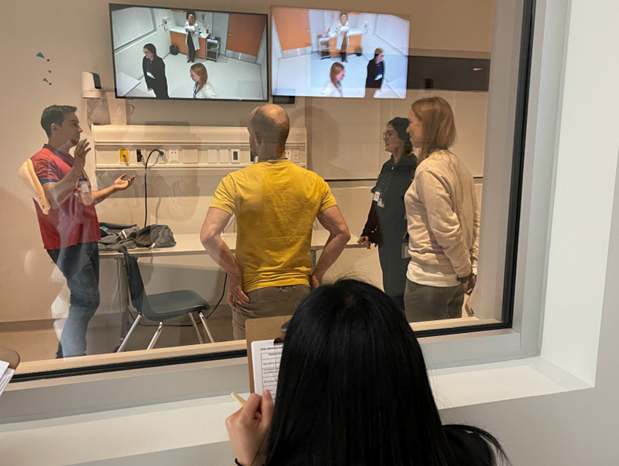
Introduction BSN Simulation Spaces
Our simulations are realistic with state-of-the art equipment and design to support learning.
Safe Learning for Compassionate Care:
In the BSN program, we follow the Center for Medical Simulation’s basic assumption such that we believe that everyone participating in simulation activities in the BCIT BSN Program is intelligent, capable, cares about doing their best, and wants to improve ©.
We also acknowledge the importance of experiential learning as one means to integrate an Indigenous approach to learning. We value the experiential learning as spaces where mistakes can be transformed into lessons about our ability to acknowledge and lean into discomfort. It is also a reminder of the importance of being mindful of context in all client-care interactions.
Types of Simulation in BSN
There are many forms of simulation that you will encounter in each BSN Term.
- In-person simulation: Application of theory and skills to a real-life clinical situation with manikins and/or human
- Skills lab: Learning and practicing specific psychomotor skills required for entry to practice competencies
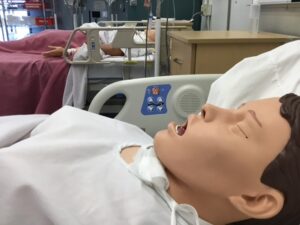
- Simulated participants: Interaction with human actors who portray a “real” patient, family, or other person, which allows for practice of communication, clinical judgement and skills

- Virtual Simulation: Allows learners to repeat scenarios for practicing clinical judgement
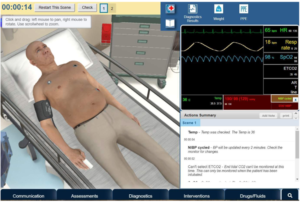
- Simulated Electronic Medical Health Records: The BSN program uses simulated electronic medical health records to prepare students for the current health industry
Simulation and Student Support
BCIT BSN has a robust approach to student success by offering faculty-facilitated open lab and workshops so students can practice outside of course hours. Our open lab has over 500 visits per term and is well-loved by our students. There are several other non-simulation supports offered to students in our program.
Simulation Learning Experience
Each simulation is designed with the following phases to maximize learning.
- Prepare: Students are given learning objectives and patient data to prepare for learning
- Apply: Students work in groups or individually in various roles to apply their theoretical learning
- Debrief: Structured reflection and feedback to help students solidify their learning
Simulation Research and Quality Improvement
The BCIT BSN program is committed to innovation in undergraduate nursing simulation through a variety of current activities.
- Grant-Funded Research: Exploring the Pedagogical Value of Faculty Feedback for Simulation Facilitation (Team: Amanda Egert (PI), Robert Kim (PI), Heather Epp, Joyce Law, Jasica Munday)
- Grant-Funded Projects: Educational Electronic Health Records, Virtu-WIL
- Other Scholarship: Simulated participants; Educational Electronic Health Records; Virtual Simulation Integration; Naloxone simulation; End of Life simulation; Evaluation in simulation; Simulation Framework; Simulation Faculty Mentorship
- Quality Improvement Projects: Student satisfaction; Competency assessment; Virtual simulation experience; Medication administration
Simulation Best Practice
BCIT BSN simulation is informed by simulation best practice standards such as from INACSL, Society for Simulation in Health Care, and the Association of Simulated Participant Educators.
Simulation Team
There are several groups that work towards creating, implementing, and maintaining the simulation learning experience. These teams are trained in simulation best-practice and many have simulation certifications such as Canadian Certified Simulation Nurse Educators (CCSNE) and Certified Health Care Simulation Educators (CHSE).
- BSN Simulation Faculty: BSN faculty who contribute to the design, facilitation, and implementation of each simulation. They also provide coaching to your instructor and support student success in the open lab.
- Your Instructor: Facilitates the simulation and supports your application of learning to the clinical setting.
- Technicians: They set up the spaces and make sure equipment and technology are running smoothly for each group.
- Others: There are many others who contribute to the simulation experience!
Simulation Partnership
BSN Simulation works with other post-secondary institutes to advance undergraduate nursing simulation for the benefit of students.
BSN is also a part of the BCIT School of Health Sciences Simulation Program
www.bcit.ca/health-sciences/simulation-in-the-school-of-health-sciences/
- Go back Graduating & Jobs
- Next up Frequently Asked Questions
Frequently Asked Questions
- How do I determine if my general health is suitable for a nursing career?
- How many days per week is a BCIT Nursing student in the hospital?
- What are the workload requirements of the program?
- What courses can be taken in advance to lighten the workload?
- Who requires a criminal record search?
- What skills are required in the nursing program?
- What writing format is used in the nursing program?
- Why are communication skills important for nursing students?
- Do I need a car in the program?
How do I determine if my general health is suitable for a nursing career?
Consider:
- Nurses work either 8 or 12-hour shifts. This time is spent standing, walking, bending, and lifting, supporting, or transferring people or objects. Nurses must be able to move quickly and efficiently, often in tight spaces.
- Nurses need to be able to support and turn patients without harming themselves or the patient.
- Nurses must be physically fit in order to be active throughout the workday. Leg, back, or foot problems may interfere. Anyone who has limited muscle strength or physical endurance may also have difficulties.
- Nurses perform skills requiring a high level of manual dexterity and coordination (for example, giving injections). Anyone with poor eye-hand coordination may have difficulties with these tasks.
- Nurses give emotional support to others and work in stressful, anxiety-producing situations. This may be difficult for anyone who has emotional or psychiatric problems or difficulty dealing with their own stress and anxiety.
- Nurses wash their hands frequently with antiseptic soaps and wear latex/rubber gloves. If you are latex-sensitive or have a latex allergy, you may not meet the health requirements, as the Nursing program and the practicum settings may not be able to accommodate your latex allergy/sensitivity.
- Skin must be intact, since exposed lesions pose a problem to both students and patients. A skin condition resulting in chronic open lesions is likely to prevent you from meeting the health requirement.
How many days per week is a BCIT Nursing student in the hospital?
Students are in a practice course (hospital or community) up to 2 days per week, until the final term of the program. In the final term of the program, students are in the hospital or community up to five full days per week.
Clinical days are scheduled on a changing rotation with shifts varying from five to twelve hours in length. Shifts can include weekends and holidays.
What are the workload requirements of the program?
This is a very demanding full-time program, working during the terms is not recommended. The program schedule requires attending classes, labs or clinical approximately 30 hours each week. Several hours of homework, which includes class and clinical preparation, will be required each evening. You will also need to plan time for library research and group work.
What courses can be taken in advance to lighten the workload?
The following courses in the BSN can be taken prior to starting the program.
- LIBS 7001
- LIBS 7002
Who requires a criminal record check?
All accepted students are required to complete a criminal record check (CRC) in order to identify individuals convicted of physical, sexual, or chemical abuse. The CRC application process will be explained in your acceptance letter.. Only criminal record checks completed through BCIT will be accepted.
If you have questions regarding the criminal record check process for Nursing students, please contact criminalrecordscheck@bcit.ca
What skills are required in the nursing program?
Computer, academic writing, and research skills are some of the requirements to be successful in the nursing program.
What writing format is used in the nursing program?
Assignments must be formatted according to American Psychological Association (APA) style.
Why are communication skills important for nursing students?
Student must be fluent in written and oral English.
For safety reasons student nurses must be able to communicate and interact with a wide range of health care professionals, patients, and families in the hospital and community. It is essential that you understand verbal and written instructions, and be clearly understood when providing information to patients, families, doctors, nurses and your instructor.
Do I need a car in the program?
In Year 3 the community rotation experiences for students without access to a private vehicle may be limited.
Clinicals take place in a variety of hospitals and community agencies, and students are required to change sites several times during the program. Transportation and all cost associated are the responsibility of the student.
- Go back BSN Simulation
- Next up Indigenous Student Support
Indigenous Student Support
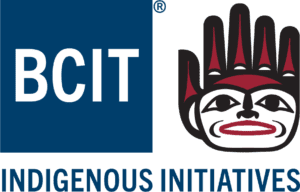
In partnership with the Indigenous Initiatives department, the BSN program has formed the BSN Indigenization Circle working group. The circle’s vision is “Reconciliation in Action” and this team actively works to promote reconciliation activities for students and faculty. The goal is to indigenize the BSN program by welcoming and working with indigenous students. By improving how we recruit, support and successfully graduate indigenous students, as well as recruit and retain indigenous faculty and staff, we hope to strengthen our program.
The BCIT BSN program is committed to the recruitment and retention of Indigenous applicants. To support applicants a dedicated Indigenous admissions process was established and 5 seats per intake are reserved for Indigenous students.
To be considered under this admission category applicants must:
- Self-identify as an Indigenous person of Canada on the admission application.
- Have successfully completed the program’s entrance requirements.
For more information on the Indigenous admissions process email: nursing@bcit.ca
Our program also works closely with Indigenous services at BCIT to ensure students receive the best possible support and encouragement while in the program. Please visit Indigenous Initiatives for more information on available resources.
Nursing Student Tuition Grant – Indigenous
The Nursing Student Tuition Grant – Indigenous released by the Ministry of Post-Secondary Education and Future Skills will be available to all self-declared First Nations, Métis and Inuit students enrolled in Bachelor of Science in Nursing (BSN), Bachelor of Psychiatric Nursing (BPN) and practical nursing (PN) programs from September 1, 2023, through to August 1, 2026.
The value of the grant is $5,000 per program year per eligible participant. Only nursing program years (not prerequisite or qualifying years) are eligible. The total maximum value of this grant per student is $15,000. Students may be eligible for lesser amounts depending on when they start and finish their programs.
The Nursing Student Tuition Grant – Indigenous is available to Canadian Citizens and Permanent Residents only, there is no application process. Tuition grants will be automatically applied by public post-secondary institutions.
More information on the Nursing Student Tuition grants can be found here [PDF].
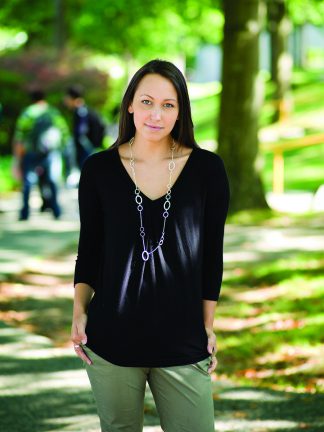
Gabrielle Guidolin
Bachelor of Science Degree in Nursing
Kelowna Metis
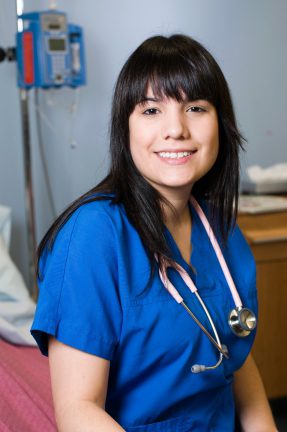
Tasia Lambert
Bachelor of Science Degree in Nursing
Pine Creek First Nation
- Go back Frequently Asked Questions
- Next up Contact Us
Subscribe
Sign up to receive updates, invitations to events, and information about BCIT and your program.
We promise not to spam you, we won’t share your personal information, and you can unsubscribe at any time.
- Go Back Contact Us
Programs and courses are subject to change without notice.


